The 12 Drummers That Neil Peart Picks His Favorites
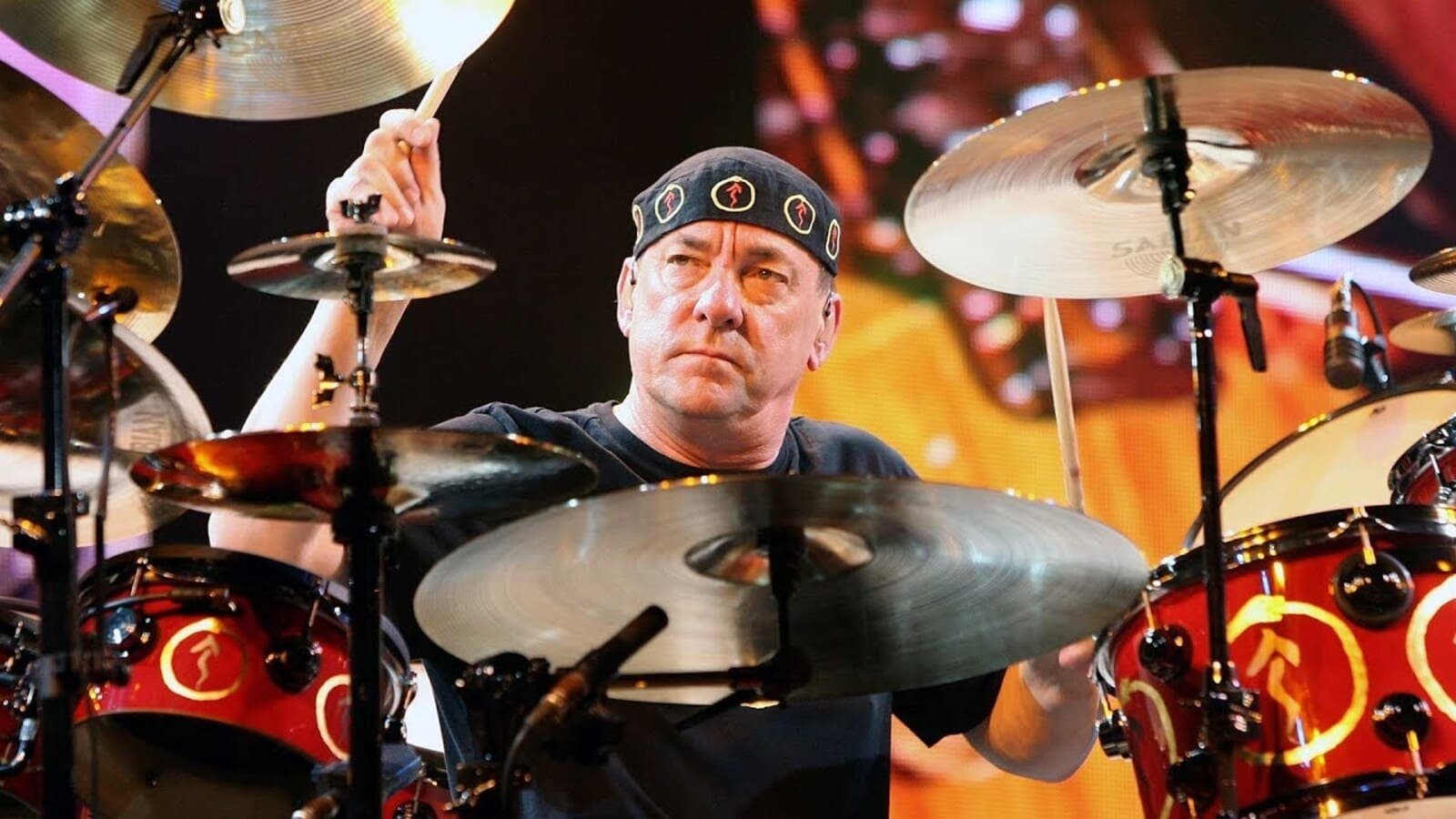
Neil Peart picks some of his favorite drummers of all time. One of the most-known drummers Neil Peart adds his complex but catchy drum parts to his tune and solo parts for music bands like Rush. In this article, we will take a look at the drummers that Neil Peart named as his favorite of all time.
Rush‘s legendary drummer and lyricist Neil Peart impacted progressive rock throughout his musical career. Peart became a known figure among fans and musicians due to his unmatched talent, approach to drumming, and songs.
Sadly, on January 7, 2020, the metal and rock music community said goodbye to a legendary musician. With this tribute, we respect Neil Peart‘s life and legacy, whose achievements remain despite his death.
Neil Ellwood Peart, born on September 12, 1952, in Hamilton, Ontario, Canada, developed a love for drumming at a young age. Peart dedicated himself to perfecting his skill, practicing, and experimenting with numerous musical styles, taking inspiration from musicians like Keith Moon and John Bonham of Led Zeppelin.
He replaced the band’s original drummer when he joined Rush in 1974, beginning a remarkable adventure of over 40 years.
In addition to his drumming skills, Neil Peart was a qualified lyricist who gave Rush‘s songs a poetic depth and philosophy. Science fiction, history, philosophy, and thinking were all topics covered in Neil Peart’s songs.
Fans of Rush and the music community continue to be influenced and inspired by Neil Peart. For young musicians, his technical skill, aesthetic way, and passion for his work continue to perform as an example.
His contributions to Rush‘s discography, which include the albums “2112,” “Moving Pictures,” and “Clockwork Angels,” continue to fascinate fans and cut around the world.
In addition to being Rush’s drummer, Neil Peart was also a visionary, a poet, and a powerful musical force. One of the finest drummers in prog-rock music, his drumming, lyrics, and dedication to greatness have all contributed to his legendary status in drumming history.
So, let’s see which drummers Neil Peart named his favorites of all time.
Neil Peart’s Favorite Drummers of All Time
Rush drummer Neil Peart has also been known to share his respect for drummers that work hard for every new album. Peart picks his favorite drummers of all time. Many genres from blues, classical rock, jazz, pop-rock, and metal also inspired him.
Who are Neil Peart’s drummer influences?
- Gene Krupa
- Buddy Rich
- Keith Moon
- Mitch Mitchell
- Ginger Baker
- John Bonham
- Terry Bozzio
- Bill Bruford
- Stewart Copeland
- Phil Collins
- Manu Katche
- Peter Erskine
Rush‘s drummer Neil Peart revealed the Top 12 Drummers of All Time in an interview with Modern Drummer magazine. Here is the Neil Peart names drummers as follows below!
1. Gene Krupa
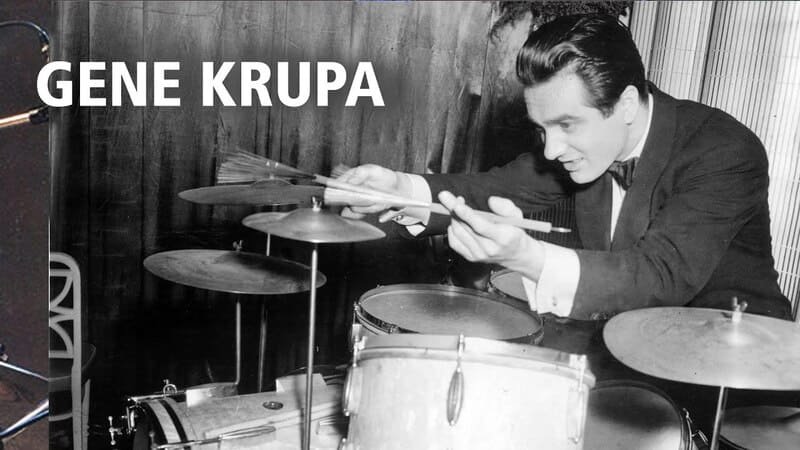
The famous jazz drummer Gene Krupa forever changed the musical landscape with his ground-breaking rhythmic innovations and thrilling performances.
On January 15, 1909, Eugene Bertram Krupa was born in Chicago, Illinois. At a young age, Krupa was enthralled by the sound of the drums and committed to learning to play it. In addition to mastering classical percussion skills, he engaged himself in the jazz culture of the 1920s and 1930s to refine his craft. Thanks to his unwavering talent and dedication, he joined several prestigious bands, including those led by Benny Goodman and Tommy Dorsey.
When Krupa was accused of possessing drugs in 1943, he had to confront a judicial struggle that threatened to ruin his reputation. He was able to defeat the accusations, and his reputation was unharmed. Beyond his drumming prowess, Krupa had a far-reaching cultural impact, personifying the spirit of disobedience and liberation associated with jazz music.
It is impossible to overestimate Gene Krupa’s influence on drumming and popular music. He made the drum set more widely used as a solo instrument and introduced energy and charisma to his performances, raising the bar for live performances.
Also, Gene Krupa’s influence was widespread, inspiring innumerable drummers in various genres, including forefathers of rock and roll like Keith Moon and John Bonham.
Neil Peart talked about why he likes Gene Krupa as one of his favorite drummers of all time:
“Gene Krupa was the first rock drummer in very many ways. Without Gene Krupa, there wouldn’t have been a Keith Moon. The first time I remember feeling a desire to play the drums was while watching the movie The Gene Krupa Story, at the age of eleven or twelve.”
2. Buddy Rich
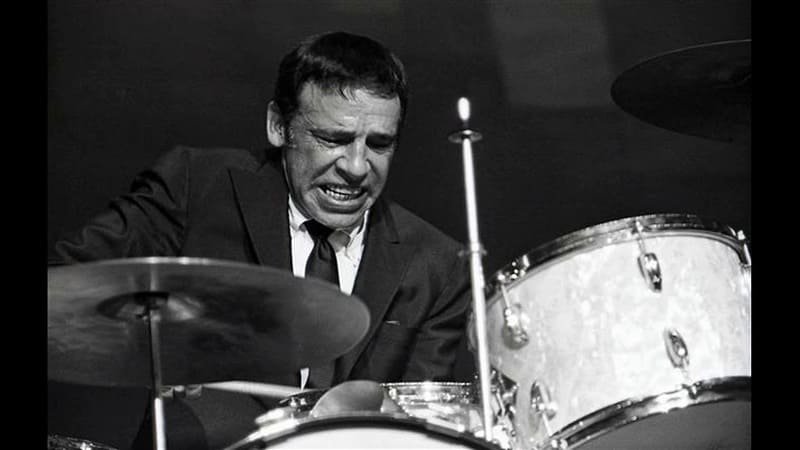
Buddy Rich‘s skill, accuracy, and showmanship impacted drumming history.
On September 30, 1917, Bernard “Buddy” Rich was born in Brooklyn, New York. His extraordinary skill and inherent sense of rhythm were obvious even at an early age. As a young star in the vaudeville circuit, Rich first gained attention for his drumming prowess and ability to captivate audiences. His early encounters created the groundwork for an extraordinary journey leading to his becoming one of history’s most admired drummers.
Buddy Rich discovered his creative niche during the 1930s and 1940s, the heyday of big band music. He worked with famous bandleaders like Tommy Dorsey and Artie Shaw, mesmerizing audiences with his thrilling solos and unyielding energy. Buddy Rich also worked with these legendary musicians, added his reputation as a drummer, and catapulted him to the jazz world’s top.
It is impossible to underestimate Buddy Rich’s influence on the drumming world and popular music in general.
His contributions to jazz and big band music have become legendary, and numerous drummers in various genres still play their instruments due to his influence. Rich continues inspiring and enthralling audiences with his records, featuring albums like “The Roar of ’74” and “Birdland,” highlighting his technical mastery and musicality.
Neil Peart spoke about why he likes Buddy Rich as one of his favorite drummers of all time:
“I would often see Buddy Rich play on television, on the ‘Tonight’ show, but I would just shake my head – he seemed too far out of reach. As Gene said about Buddy, ‘There are all the great drummers in the world—and then there’s Buddy’.”
3. Keith Moon
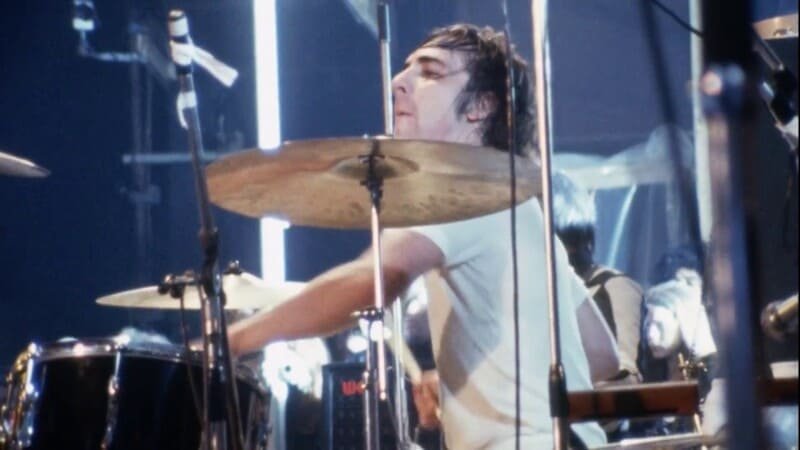
Keith Moon is the legendary drummer of The Who. Keith John Moon was born in Wembley, London, England, on August 23, 1946. He had an unstoppable energy level and a rhythm that came naturally to him from an early age.
Moon’s passion for big band jazz and his ambition to push traditional rock drumming limits helped form his explosive playing style. He distinguished himself from his predecessors with his innovative style, defined by frantic fills, unusual timekeeping, and an endless sense of melody.
Rock drummers were held to a higher level due to his constant search for the limitations of his instrument, which also had a profound impact on many artists of other genres. His unusual approach and propensity for crafting memorable and legendary drum sections are best exemplified by songs like “Baba O’Riley” and “My Generation.”
When Keith Moon departed unexpectedly on September 7, 1978, at 32, his life was cut short. His sudden passing signaled the end of an era and created a gap in the music industry. His influence and impact have not faded, nevertheless.
Rock and roll history was permanently changed by the irresistible force behind the drum kit, Keith Moon. He is a real original because of his explosive drumming technique, larger-than-life charisma, and wild energy.
Neil Peart talked about why he likes Keith Moon as one of his favorite drummers of all time:
“It is certainly true that Keith Moon was one of the first drummers to get me [Nein Peart] really excited about rock drumming.”
4. Mitch Mitchell
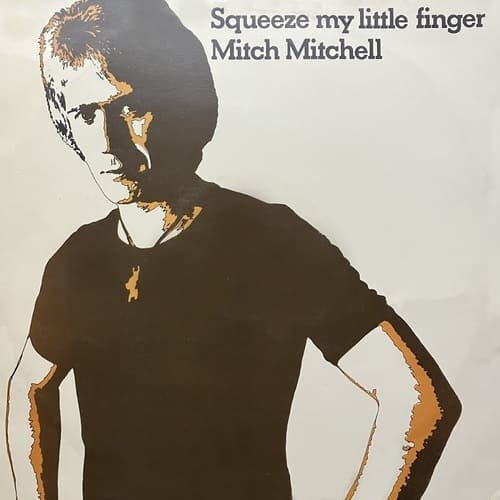
The Jimi Hendrix Experience‘s original drummer, Mitch Mitchell, infused his drumming with a special fusion of jazz delicacy and rock strength.
John “Mitch” Mitchell was born in Ealing, London, England, on July 9, 1947. His early exposure to jazz music, especially the drumming of masters like Max Roach and Elvin Jones, influenced his style. Mitchell distinguished himself from other musicians by fusing complicated jazz rhythms and improvisation into the backdrop of rock music.
Mitch Mitchell’s combination with bassist Noel Redding and guitar prodigy Jimi Hendrix resulted in a musical connection that can only be described as amazing.
Furthermore, Mitchell’s drumming supported Hendrix’s inventive guitar playing, flawlessly fusing complex rhythms and powerful strength with the group’s psychedelic rock sound. Together, they came up with several timeless masterpieces, such as “Purple Haze,” “Foxy Lady,” and “Voodoo Child (Slight Return).”
The music industry mourned the passing of Mitch Mitchell on November 12, 2008. Even if his physical presence is no longer here, his influence and legacy endure.
We honor Mitch Mitchell, the visionary drummer who took rock drumming to new heights and permanently engraved his mark in the annals of musical history, as we look back on his incredible career.
Neil Peart reveals why he likes Mitch Mitchell as one of his favorite drummers of all time:
“I remember my teacher playing a record, then telling me, ‘This changes everything.’ It was Jimi Hendrix’s Are You Experienced? with Mitch Mitchell’s artful and innovative drumming.”
5. Ginger Baker
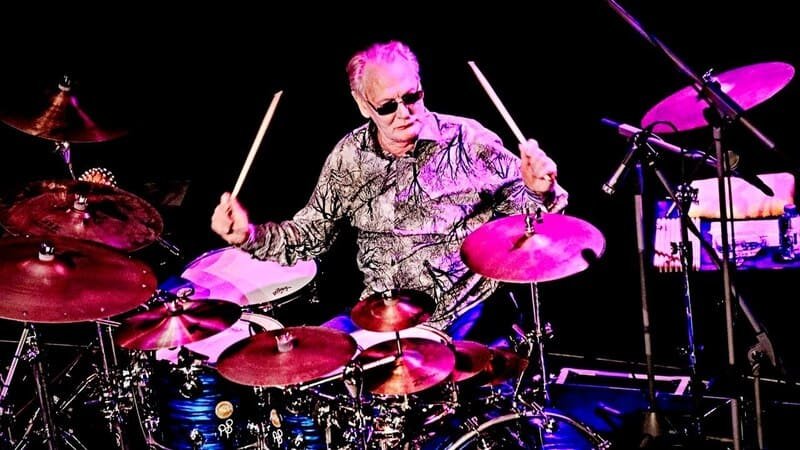
Ginger Baker was born on August 19, 1939, in Lewisham, London, England, as Peter Edward Baker. As a child, he appreciated jazz and took lines from master drummers like Max Roach and Art Blakey. In addition, Baker’s interest in Middle Eastern and African rhythms significantly influenced defining his sound and distinguishing him from his contemporaries in the budding rock scene.
Ginger Baker became a famous drummer due to his important contribution to the band Cream. In the late 1960s, Baker created a new style with Jack Bruce and Eric Clapton that fused blues, rock, and psychedelic influences. He attracted listeners with his booming drumming, which was included in singles like “Sunshine of Your Love” and “White Room,” elevating Cream to the top of the rock music hierarchy.
He also developed beyond rock because of his interest in and enthusiasm for musical discovery. He worked with artists from many cultures while immersing himself in music from the Middle East and Africa. His collaboration with the Nigerian Afrobeat pioneer Fela Kuti and the establishment of the jazz-rock band Ginger Baker’s Air Force both demonstrated his dedication to fusing genres and expanding the possibilities for musical expression.
Also, Ginger Baker‘s major stylistic inspirations are Phil Seamen, Art Blakey, Max Roach, Elvin Jones, Philly Joe Jones, and Baby Dodds.
Baker claimed that he was primarily self-taught and only played a few exercises with Seamen, even though he was generally regarded as one of Seamen’s students.
Baker frequently used a much more restrained and straightforward performance style that was influenced by the British jazz groups he heard in the late 1950s and early 1960s, even though he rose to fame during his time with Cream for his wild, unpredictable, and performances that were similar to those of Keith Moon from the Who. Although Baker is sometimes described as a “rock drummer,” he desired to be known simply as “a drummer” or a jazz drummer.
Neil Peart tells why he likes Ginger Baker as one of his favorite drummers of all time:
“His playing was revolutionary. Extrovert, primal, and inventive. He set the bar for what rock drumming could be. I certainly emulated Ginger’s approaches to rhythm – his hard, flat, percussive sound was very innovative. Everyone who came after built on that foundation. Every rock drummer since has been influenced in some way by Ginger – even if they don’t know it.”
6. John Bonham
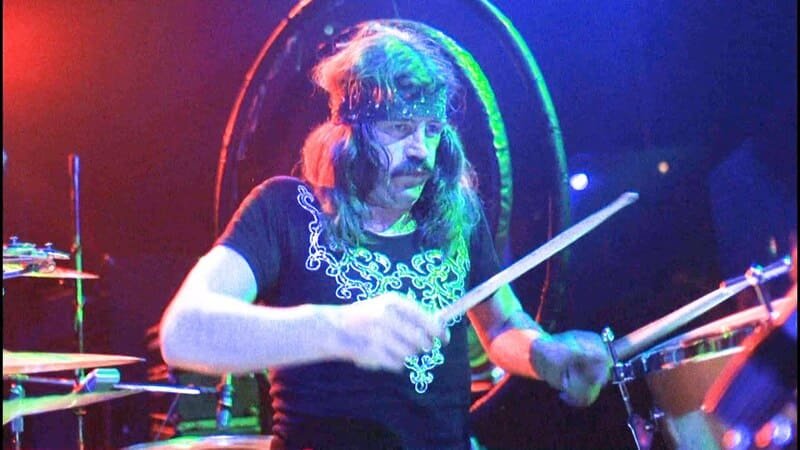
Rock and roll music was forever changed by the revolutionary drumming technique and dominating presence of Led Zeppelin‘s legendary drummer John Bonham.
John Henry Bonham was born in Redditch, England, on May 31, 1948. His talent and love for drumming were obvious even as a young child. Early musical influences on Bonham included rhythm and blues, jazz, big band music, and more, which shaped his dynamic and adaptable drumming technique. His career as a drummer took him to various bands and ensembles, finally resulting in Led Zeppelin’s establishment.
Self-taught John Bonham was influenced by Max Roach, Gene Krupa, and Buddy Rich. We also mentioned some of the drummers above and below in this article. Carmine Appice, the drummer for Vanilla Fudge, introduced him to Ludwig’s drums. While he was best recognized for his hard-rock style during his lifetime, his reputation as a drummer has expanded beyond that genre in the years since his death.
He has impacted many drummers, including Dave Grohl, Neil Peart, Chad Smith, and Dave Lombardo, to name a few. In 1995, he was inducted into the Rock & Roll Hall of Fame as a member of Led Zeppelin. Rolling Stone ranked him the greatest drummer of all time in 2016.
John Bonham made important contributions to Led Zeppelin. His massive drumming elevated the band’s strong blues-rock sound to new heights. Jimmy Page’s guitar mastery, Robert Plant‘s vocals, and John Paul Jones’s bass lines were all enhanced by Bonham’s thunderous grooves, immaculate timing, and tireless drive. They created a musical connection that cemented Led Zeppelin’s place as one of the greatest rock bands ever.
His bass drum, powerful fills, and sophisticated hi-hat work formed a dynamic and driving force behind the music of Led Zeppelin. Songs like “Rock and Roll,” “Kashmir,” and “When the Levee Breaks” showed his outstanding ability to together rock, blues, and funk influences into cohesive, enjoyable rhythmic drum parts.
Bonham’s skill and performance inspire drummers of all genres, and his name is frequently recognized as one of the best drummers ever.
The rock and roll music world grieved the death of John Bonham on September 25, 1980. His untimely death ended Led Zeppelin’s career and left a space in the rock world. However, his indelible influence on music and his pioneering drumming style continues to ring true with fans and musicians alike.
7. Terry Bozzio
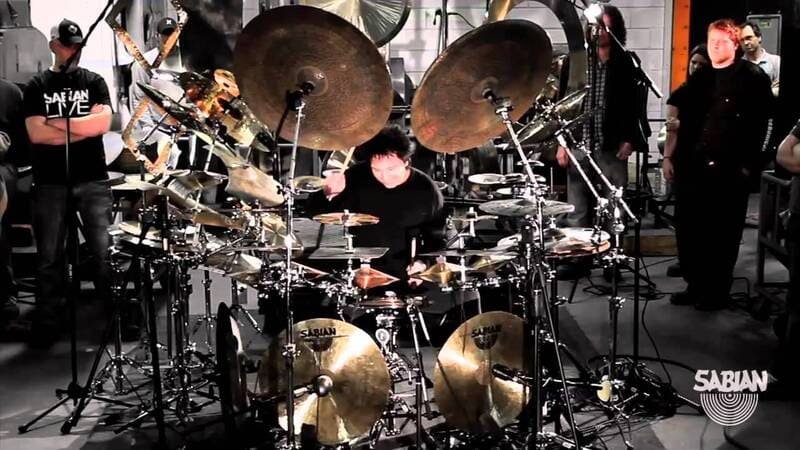
Terry Bozzio, percussionist, and drummer, has pushed the limits of rhythm and expanded the potential of drumming as an art form.
Terry John Bozzio was born in San Francisco, California on December 27, 1950. His love of music and dedication to his art was evident from a young age. Early influences ranging from jazz and classical to rock and avant-garde influenced Bozzio’s wide and eclectic drumming approach. His unwavering pursuit of pushing rhythmic limits led him to collaborate with some of the most forward-thinking musicians of his day.
He has appeared on nine solo or collaborative albums, 26 Zappa albums, and seven Missing Persons albums. Since the mid-1970s, Bozzio has been a prolific sideman, appearing on countless records by different musicians. In 1997, he was inducted into the Modern Drummer Hall of Fame. His son and stepdaughter are drummers, with Marina being a member of the band Aldious.
Terry Bozzio’s breakthrough came in the late 1970s when he joined Frank Zappa’s band. His skill as a musician and ability to execute complicated polyrhythms made him an ideal match for Zappa’s difficult compositions. Bozzio’s contributions to albums such as “Joe’s Garage” and “Sheik Yerbouti” showed his skill, creativity, and talent.
Solo drumming performances by Bozzio have become legendary. His avant-garde usage of melodic and tuned percussion and his deft hand and foot skills produce a symphony of rhythmic textures and musicality. His solo performances, which often affect multiple drums and percussion parts, fascinate audiences and demonstrate his unique ability to turn the drum set into a melodic and percussive orchestra.
8. Bill Bruford
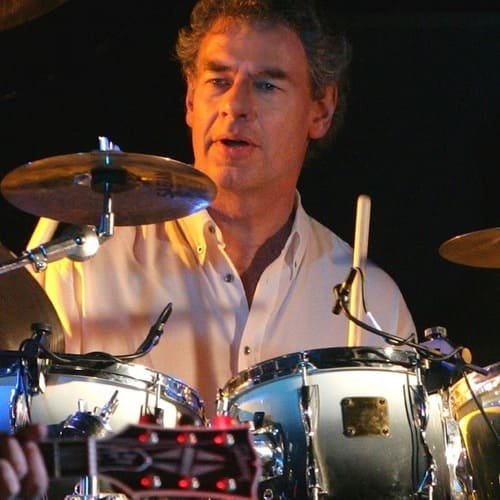
Bill Bruford‘s musical adventure began on May 17, 1949, in Sevenoaks, England, during the golden era of progressive rock. During his early years, he was a member of Yes, one of the genre’s most legendary bands. His complex drumming and knowledge formed the foundation for Bruford’s progressive style to smoothly combine rock, jazz, and classical influences.
His drumming on albums such as “Larks’ Tongues in Aspic” and “Red” pushed conventional structures and demonstrated his ability to construct complicated rhythmic patterns that brought depth and complexity to the band’s sound. His relationship with guitarist Robert Fripp produced some of the era’s most revolutionary and influential progressive rock music.
Bruford successfully integrated intricate jazz-infused songs with his signature progressive rock sensibilities on albums like “Feels Good to Me” and “One of a Kind.”
During his solo career, Bill Bruford launched distant into jazz territory, delivering albums like “Gradually Going Tornado” and “Earthworks.” Collaborations with prominent jazz artists cemented his reputation as a drummer with a deep sense of musicality and an instinctive ability to meld genres fluidly.
After a four-decade career, Bruford announced his retirement from public performances in 2009. His musical legacy. However, continues to live on, and his influence can be heard in the playing of innumerable drummers who aim to mimic his precision, originality, and boundary-pushing approach to rhythm.
9. Stewart Copeland
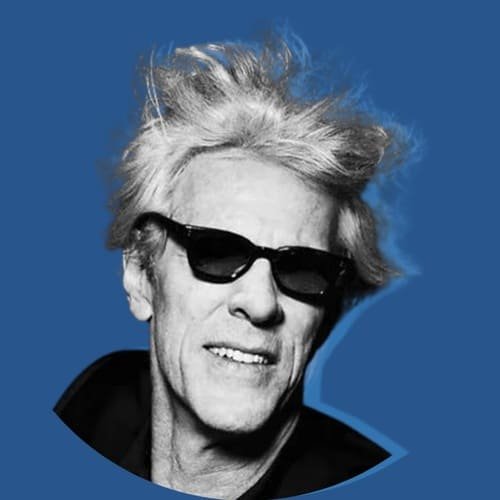
Stewart Copeland, the master drummer and founding member of The Police, has made an impression on the music industry with his dynamic and influential drumming technique.
Stewart Armstrong Copeland was born in Alexandria, Virginia on July 16, 1952. Growing up in a musical family, he was strongly interested in rhythm and percussion. Copeland’s various musical inspirations, which ranged from rock and reggae to jazz and world music, shaped his drumming technique. His early experiences as a session musician and time with bands like Curved Air laid the groundwork for his success.
Also, Stewart Copeland came to international fame as The Police’s drummer. He helped establish a sound that combined rock, reggae, and punk with Sting and Andy Summers, attracting audiences worldwide. Copeland’s aggressive and precise drumming served as the foundation for successes such as “Roxanne,” “Message in a Bottle,” and “Every Breath You Take,” raising The Police’s music to legendary status.
Copeland’s drumming technique was defined by his command of dynamics, complex syncopation, and creative use of percussion instruments.
His use of Latin and African rhythms, precise snare work, and tight hi-hat patterns gave The Police’s music a particular taste. Copeland’s usage of unusual percussion devices, such as the Simmons SDS-V drum synthesizer, emphasized his creative approach to drumming even more.
10. Phil Collins
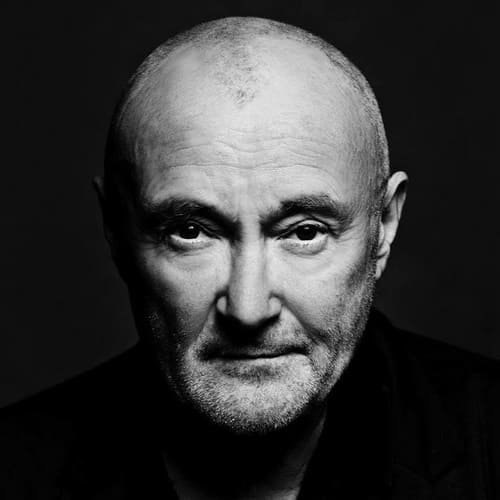
Phil Collins, a multi-talented musician, and drummer, has left an unforgettable mark on the music world with his flawless drumming skills, soulful vocals, and songwriting methods.
Phil Collins began his musical career as a drummer after being born on January 30, 1951, in London, England. His early days as a session musician led him to join the progressive rock band Genesis, where he would demonstrate his extraordinary drumming abilities and contribute to the Genesis band’s progression.
Collins’ solo career took off in the 1980s, with a succession of chart-topping successes demonstrating his creative abilities and ability to connect with fans on a deep level. Songs like “Against All Odds (Take a Look at Me Now)” and “Another Day in Paradise” exemplified Collins’ emotional depth and lyrical storytelling, gaining him critical acclaim and commercial success.
He increased to prominence as a film soundtrack composer, winning an Academy Award for his hit song “You’ll Be in My Heart” from Disney’s “Tarzan.”
His discography also includes eight studio albums that have sold an estimated 150 million records worldwide and 33.5 million certified units in the United States, making him one of the world’s best-selling artists.
Along with Paul McCartney and Michael Jackson, he is one of only three music artists to have sold over 100 million records as a solo artist and band member.
11. Manu Katché
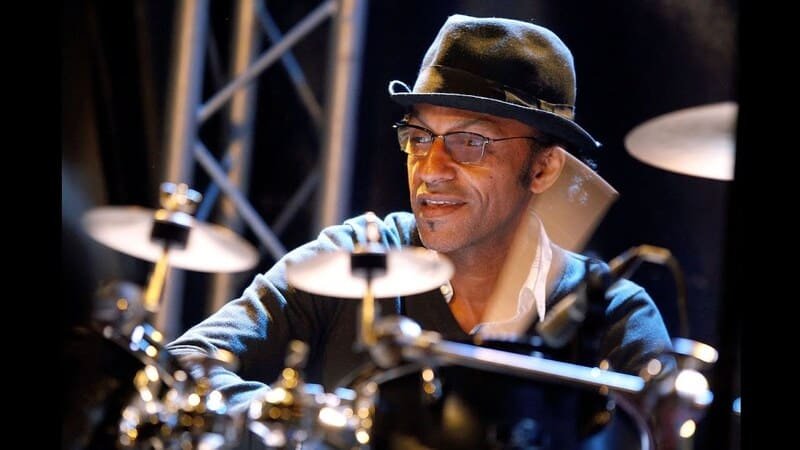
Manu Katché, a talented drummer and percussionist, has carved out a distinct musical path by smoothly fusing jazz sensibilities with varied world rhythms.
Manu Katché began his musical career as a self-taught drummer on October 27, 1958, in Saint-Maur-des-Fossés, France. His love of rhythm drove him to pursue music at the Conservatoire de Paris, where he honed his skills and broadened his musical horizons. Katché’s musical inspirations ranged from jazz and rock to African and Latin rhythms, shaping his unique and dynamic playing style.
His collaborations with artists such as Peter Gabriel, Sting, and Joni Mitchell highlighted his ability to adapt to many musical styles.
Manu Katché‘s solo career highlighted his percussion mastery. His 1991 debut album, “It’s About Time,” displayed his unique musical vision to the world. The “Katché sound,” distinguished by complicated rhythms, nuanced dynamics, and the use of unusual percussion instruments, enthralled listeners and garnered him critical acclaim. Following albums, such as “Neighbourhood” and “Third Round,” highlighted Katché’s abilities as a conductor and composer.
12. Peter Erskine
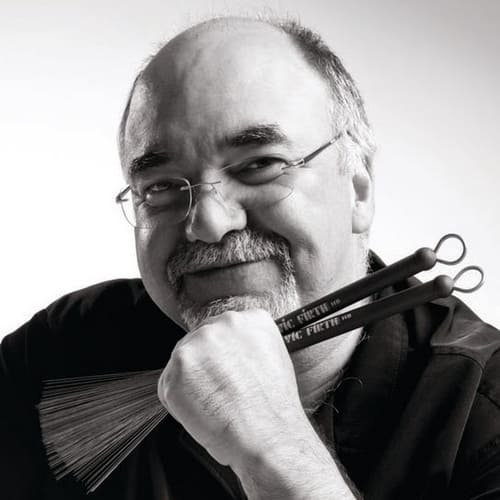
With his artistry, technical excellence, and natural musicality, Peter Erskine, the passionate and versatile drummer, has left an obvious impression on jazz and beyond.
Peter Erskine, born June 5, 1954, in Somers Point, New Jersey, USA showed an early talent for rhythm and drumming. His formal education at Indiana University School of Music and his tutelage under legendary drummer Stan Kenton laid a solid foundation for his future career. Erskine’s desire to experiment with several musical genres, ranging from jazz to fusion, created his varied and unique playing style.
In 1978, Erskine’s career took off when he joined the legendary jazz fusion band Weather Report. Erskine’s drumming on songs like “Heavy Weather” and “Night Passage” cemented his reputation as a powerful force in the fusion genre.
Beyond Weather Report, collaborations with various performers have distinguished Peter Erskine’s artistic path. From partnering with jazz stalwarts like Chick Corea and Pat Metheny to rock titans like Steel Dan and Joni Mitchell, Erskine’s ability to adapt and bring his unique voice to numerous musical situations has set him apart.
What are your thoughts on Neil Peart‘s favorite drummers of all time? Let me know in the comment section!
I miss Neil Peart terribly and love to read anything that I can about him or from him. I remember him speaking on each one of these drummers and how they influenced him and others. He always seemed shy of the spotlight to me but I know now that he just didn’t really like for people to put him on a pedestal when he felt that many others deserved attention and accolades as much if not more than he did. In my eyes he was a magician on the kit and a true artist and gentleman on top of it all. The lyrics that he wrote along with the music that Lifeson and Lee wrote were more than entertaining, they brought feelings and enlightenment to the music world. For a band to span four decades having not only stayed together but producing an album nearly every year during that span is remarkable and speaks on how enduring and truly special that not only Peart but Lifeson and Lee are. It’s remarkably sad that we aren’t going to get to hear whatever else that they would have come up with. I know that Rush’s music will bring pleasure, thought and even sadness for generations to come.